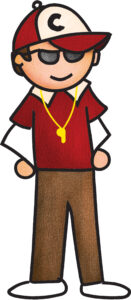By Nadine Briggs and Donna Shea
As spring sports swing into gear, I (Nadine) recall when my son played club soccer. He had a coach at one point who had played the game at the collegiate level. The coach had just finished his undergraduate program and had enrolled in graduate school. He was younger than most of the coaches but knew the game inside and out. As a newer coach lacking in experience, he did not understand the impact that he had on his young players. He used to wrestle with them, which they loved but he didn’t realize that he only engaged with the best soccer players on the team. In practice, the best players received the best from him while comparatively ignored the lesser talented kids.
 Whenever they played the girls’ team in practice, he would make chauvinistic comments. The girls would usually win, which would result in a display of intense anger. If he played against the girls, he would kick the ball at them as though he was on his college team despite the fact that these kids were 10-12 years old. His temper was quick, and he could be intimidating. At one point during a game when the referee didn’t call it the way he saw it, he ripped into her. He was screaming and swearing and losing it on her. She sat in the middle of the field with all the players and parents watching her cry. To her credit, she did yell back that she was only 16 and that he couldn’t talk to her like that. The parents tried to stop him from continuing his attack on her. It was an awful scene and humiliating for the team he represented.
Whenever they played the girls’ team in practice, he would make chauvinistic comments. The girls would usually win, which would result in a display of intense anger. If he played against the girls, he would kick the ball at them as though he was on his college team despite the fact that these kids were 10-12 years old. His temper was quick, and he could be intimidating. At one point during a game when the referee didn’t call it the way he saw it, he ripped into her. He was screaming and swearing and losing it on her. She sat in the middle of the field with all the players and parents watching her cry. To her credit, she did yell back that she was only 16 and that he couldn’t talk to her like that. The parents tried to stop him from continuing his attack on her. It was an awful scene and humiliating for the team he represented.
This coach was young, inexperienced, immature and chauvinistic. How much of an impact did he have on this team of 10-year-old boys? No one knows. One can only hope that they weeded through their experience with him as their coach and only the seeds of the positive lessons grew.

